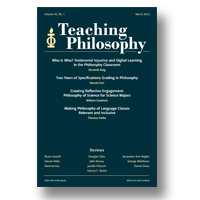|
articles |
|
1.
|
Teaching Philosophy:
Volume >
46 >
Issue: 1
Dustin Locke
The Levels System:
An Application of Mastery Learning
abstract |
view |
rights & permissions
| cited by
This paper describes an application of mastery learning to the teaching of philosophical writing—an approach I call “the Levels System.” In this paper, I explain the Levels System, how I integrate it into my course, and the pedagogical research supporting the principles of mastery learning on which it is built. I also compare the Levels System to Maryellen Weimer’s “menu approach,” Linda Nilson’s “specifications grading,” and Fred Keller’s “personalized system of instruction.” I argue that the Levels System has many of the virtues of these other systems and some additional virtues of its own.
|
|
|
|
|
2.
|
Teaching Philosophy:
Volume >
46 >
Issue: 1
Sally J. Scholz
Graduate Seminars and the Climate Problem in Philosophy
abstract |
view |
rights & permissions
| cited by
Designing a successful graduate seminar should account for more than just the content to be conveyed and the completion of the standard seminar paper. This article dissects the seminar structure, revealing some of what is obscured by the “hidden curriculum” of graduate education, with an eye toward transforming the climate in philosophy. I begin with a brief review of literature on graduate teaching and inclusive teaching in philosophy. I then examine four components of a typical graduate seminar: the faculty instructor of graduate courses, the graduate students themselves, the material selection, and the course requirements. Reflecting on the graduate seminar compels revisiting learning goals, ensuring inclusivity and accessibility, and adopting a more intentional approach to graduate course design that ties course goals to specific activities and assessments for the life of the professional philosopher.
|
|
|
|
|
3.
|
Teaching Philosophy:
Volume >
46 >
Issue: 1
Julia Staffel
Probability without Tears
abstract |
view |
rights & permissions
| cited by
This article is about teaching probability to students of philosophy who don’t aim to do primarily formal work in their research. These students are unlikely to seek out classes about probability or formal epistemology for various reasons, for example because they don’t realize that this knowledge would be useful for them or because they are intimidated by the material. However, most areas of philosophy now contain debates that incorporate probability, and basic knowledge of it is essential even for philosophers whose work isn’t primarily formal. In this article, I explain how to teach probability to students who are not already enthusiastic about formal philosophy, taking into account the common phenomena of math anxiety and the lack of reading skills for formal texts. I address course design, lesson design, and assignment design. Most of my recommendations also apply to teaching formal methods other than probability theory.
|
|
|
|
|
4.
|
Teaching Philosophy:
Volume >
46 >
Issue: 1
Dana Trusso
Creating a Virtual Symposium:
The Benefits of Using a Democratic Syllabus
abstract |
view |
rights & permissions
| cited by
Democratizing the syllabus has been discussed in the fields of sociology and political science but rarely in philosophy. In this paper I will draw upon my experience of teaching Philosophy of Love in an online modality to examine the impact on motivation when students fill in the gaps presented in a democratic syllabus.
|
|
|
|
|
book reviews |
|
5.
|
Teaching Philosophy:
Volume >
46 >
Issue: 1
Olcay Bayraktar
Discovering Philosophy, by Thomas I. White
view |
rights & permissions
| cited by
|
|
|
|
|
6.
|
Teaching Philosophy:
Volume >
46 >
Issue: 1
Paul J. D'Ambrosio
Growing Moral: A Confucian Guide to Life, by Stephen Angle
view |
rights & permissions
| cited by
|
|
|
|
|
7.
|
Teaching Philosophy:
Volume >
46 >
Issue: 1
Kevin M. DeLapp
Interpreting Chinese Philosophy: A New Methodology, by Jana S. Rošker
view |
rights & permissions
| cited by
|
|
|
|
|
8.
|
Teaching Philosophy:
Volume >
46 >
Issue: 1
Mehmet Ali Dombayci
This Is Environmental Ethics An Introduction, by Wendy Lynne Lee
view |
rights & permissions
| cited by
|
|
|
|
|
9.
|
Teaching Philosophy:
Volume >
46 >
Issue: 1
Lona Gaikis
Introduction to Philosophy: Aesthetic Theory and Practice, edited by Valery Vino
view |
rights & permissions
| cited by
|
|
|
|
|
10.
|
Teaching Philosophy:
Volume >
46 >
Issue: 1
Catlyn Keenan
African Philosophy: Emancipation and Practice, by Pascah Mungwini
view |
rights & permissions
| cited by
|
|
|
|
|
11.
|
Teaching Philosophy:
Volume >
46 >
Issue: 1
Fraser Landry
Becoming Great Universities: Small Steps for Sustained Excellence, by R. J. Light and A. Jegla
view |
rights & permissions
| cited by
|
|
|
|
|
12.
|
Teaching Philosophy:
Volume >
46 >
Issue: 1
David Sackris
A Better Ape: The Evolution of the Moral Mind and How it Made us Human, by Victor Kumar and Richmond Campbell
view |
rights & permissions
| cited by
|
|
|
|
|
13.
|
Teaching Philosophy:
Volume >
46 >
Issue: 1
Daniel G. Shaw
Classics in Western Philosophy of Art, by Noel Carroll
view |
rights & permissions
| cited by
|
|
|
|
|
14.
|
Teaching Philosophy:
Volume >
46 >
Issue: 1
Angeliki G. Vasilopoulou
Altruism or the Other as the Essence of Existence: A Philosophical Passage to Being Altruistic, by Iraklis Ioannidis
view |
rights & permissions
| cited by
|
|
|
|
|
|
|
15.
|
Teaching Philosophy:
Volume >
46 >
Issue: 1
Call for Papers:
Large Language Models and Teaching Writing
view |
rights & permissions
| cited by
|
|
|
|
